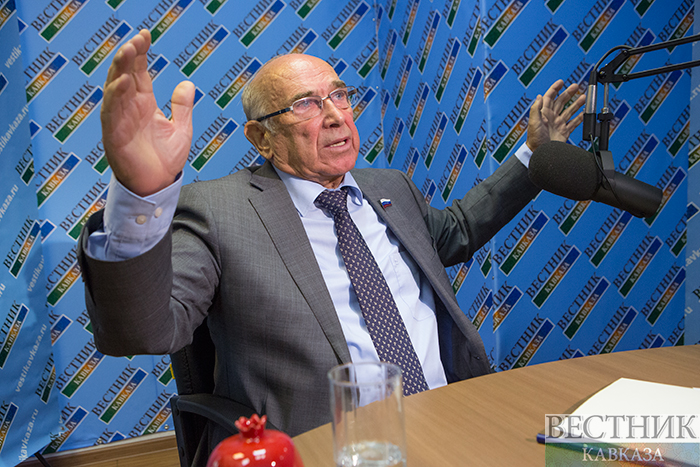Tribuna’s gust is Victor Rogotsky, a member of the Federation Council Committee on Economic Policy, a senator from the Yaroslavl Region. Together with Vladimir Nesterov, he discusses the situation in the Russian energy sector.
- Viktor Viktorovich, please tell us in what direction should the Russian energy sphere develop? What should we emphasize?
- In 2008, when the reform of RAO UES was finished, we took the direction of the market economy. Huge investment was required; we hoped that the energy increase would be some 4-5% of electricity consumption per year. It was necessary to attract huge investments, trillions of rubles, in order to develop the energy power to give an opportunity to develop a major processing enterprises, agro-industry, etc.
So we created an electricity market which consists of two levels. The wholesale market was more or less formatted and worked in a balance. The second level was the retail market. On the retail market, we have a lot of work to do. Nevertheless, we have set up the electricity market, and the electricity price is determined on a competitive basis in the wholesale sector. The selection of the electricity suppliers is carried out according to one criterion. Our friend is the one who is cheaper.
But we have so-called forced generation. This is that old generation, not necessary one, smoking, fuming, demanding huge spending, with a high cost of a kilowatt hour, but we cannot stop using it right now, because it is mainly connected to the heating supply of the city. Therefore, they should stop forced generation. That means to establish a deadline and stop.
We must speak clearly about this, so people understand what to do with this excess electricity, which was conceived and built to replace the old generation and for the new enterprises to start working. It is necessary to define strictly the reserve. The energy sector cannot work without a reserve. There is no way to store the energy companies’ products. We have not made such powerful storages yet. The synchronization of production and consumption of electricity are a complexity of this production. Therefore, it is necessary to understand clearly what size the reserve should be in case of emergency, unplanned exit. Everything else should be immediately used for a withdrawal of the old equipment. So it is no longer working and replaced with these new units, which, of course, are of a high-performance, low fuel consumption per unit of production.
The heating market is the most difficult issue in the reform. We should still invest and develop the network economy and eliminate cross-subsidization. Cross-subsidization appears when you pay more for fewer things. That means the large enterprises pay for the public and for the group, which are equated to a category of the population. Cross-subsidization involves tens of billions of rubles and this is the value. Therefore, the production costs are rising, and it becomes uncompetitive or less competitive on the market. But if we remove the cross-subsidies at once, we have to raise the prices sharply for the public and small businesses.
The process is very difficult, due to the internal and external circumstances. And the domestic circumstances are related to the external circumstances. So while there is no balance in the system, we should solve these problems together.

- Viktor Viktorovich, in the framework of our program we have a traditional column called 'From Kamchatka Territory to Kaliningrad Oblast', in which we ask our guests, senators and politicians about the region they represent in the Federation Council, or in any other state institutions, and is this region attractive for domestic tourism. Probably we can talk about Yaroslavl Oblast for hours. Let's talk about your favorite places.
- The Motherland begins from your parent's home, the place where you grew up, where you were born, where you lived. I love my Yaroslavl region, a beautiful and interesting region, a center of the Golden Ring, which includes a number of cities of Central Russia. In general, in Yaroslavl, people have been engaged in tourism and trips for a long time. Yaroslavl was probably one of the first cities where in 1914 'Russian Traveler' magazine was published. More than a hundred years ago, we already thought that we must think about the fact that we need to disclose our wealth and territory, invite people to look at them. And now we pay a lot of attention to the development of tourism in the Yaroslavl Region, we have a whole program. It was drafted from 2010 to 2015 inclusively. 2010 was the year of the millennium of Yaroslavl.
Those who have not see Yaroslavl, I would like to invite them to the Yaroslavl strelka, Vyatskoe village, a magnificent open-air museum, where with the hands of enthusiasts, they received the state prize for the development of Vyatka Territory from the President. Now, many of our famous artists and writers visit it, in general, there are a lot of big seminars and meetings. Come to Yaroslavl Region to see it. It is a beautiful region, an amazing region. Because it is a region that was the capital of Russia in the Time of Troubles in 1612. For three months, but still, it was the capital of Russia, when Moscow was captured by the Poles. An ancient City, an ancient land. Together with the entire country, it has experienced all the hardships and adversity, survived, endured, won and develops confidently, powerfully. I think that despite all the difficulties that exist now, not only in the Yaroslavl Region, but the republics, territories, all regions of our country will surely grow.






